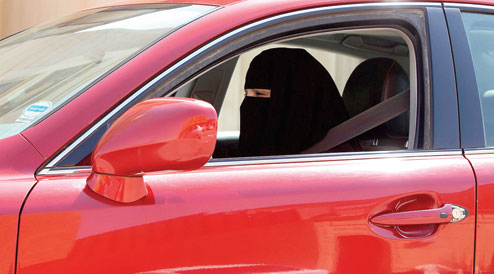
Oct. 8: Saudi Arabia's historic decision to allow women to drive in the country is causing jitters in faraway Kerala, where lakhs of families depend on remittances sent by Malayalis working in the oil-rich kingdom.
Till now the only country that didn't let its women drive, Saudi Arabia has been a magnet for expatriate "house drivers" (chauffeurs working for Saudi families), especially from Kerala.
Working Saudi women often spent a good chunk of their salaries on these drivers, who are now faced with the threat of job loss.
"Malayalis have long dominated the professions of driver, housemaid, caretaker and small trader in Saudi Arabia. While nationalisation has over the years chipped away at the expatriate workforce, our drivers are now set to lose their jobs," K.V. Abdul Khader, CPM legislator from Guruvayur and chairman of the Pravasi Welfare Committee of the Assembly, told The Telegraph.
While "nationalisation" refers to initiatives to reserve jobs for Saudi nationals, the issuance of drivers' licences to women is the outcome of a long battle for gender equality.
"We don't yet know how many jobs will be lost, but we are sure that Malayalis will be hit the worst," said Khader, who had earlier travelled to various Gulf countries to assess the job scenario for Indian expatriates.
He estimated that the expatriate "house drivers" in Saudi Arabia numbered around 14 lakh, a huge majority of whom are Indians, specifically Malayali Muslims who speak Arabic.
"Our government will discuss these issues and work out how to rehabilitate expats returning from the Gulf," Khader said.
The Left Democratic Front government has announced a Loka Kerala Sabha (Global Kerala Conclave) in Thiruvananthapuram next January, to be attended by Kerala's MLAs and MPs and representatives of non-resident Keralites from across the world.
"Issues such as this (possible job losses in Saudi Arabia) will be discussed to find a solution," Khader said.
K.N. Harilal, a member of the Kerala State Planning Board, was more hopeful. "Wealthy Saudi families might find it convenient to retain their expat drivers; so let's hope the impact is minimum," he said.
About 30,000 Keralite expats had lost their jobs when the Saudi government recently decided that at least half of all jobs at mobile phone shops must go to Saudi nationals. Some were able to switch professions but many returned home. The fall in oil prices and a real estate slump too have taken a toll on migrant workers' jobs.
To tackle the situation, the Kerala government this year doubled the budget for the department of Non-Resident Keralites' Affairs (Norka) to Rs 61 crore and promised to raise the allocation every year in anticipation of more job losses.
The state government provides a monthly Pravasi Welfare Pension of Rs 1,500 to blue-collar Keralite workers who return home from abroad but cannot find work because of poor health or advanced age.
Every Gulf state has been scaling up nationalisation, introducing the policy to ever newer sectors. But the impact is greatest when Saudi Arabia and the United Arab Emirates do it because they employ more expatriates, especially those from Kerala, than the rest.
According to one estimate, some 40 lakh Keralites work abroad, 80 per cent of them in the Gulf states, and support more than 50 lakh families in Kerala. The remittances they send home account for about 35 per cent of the state's GDP.

